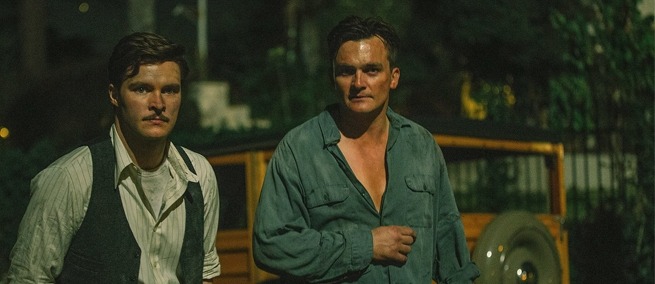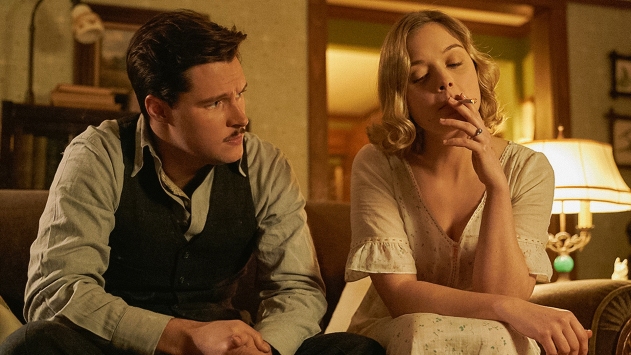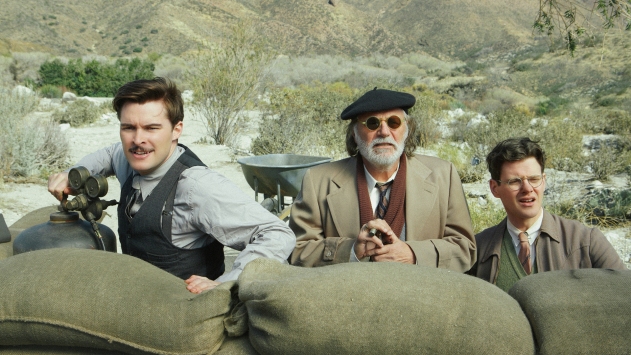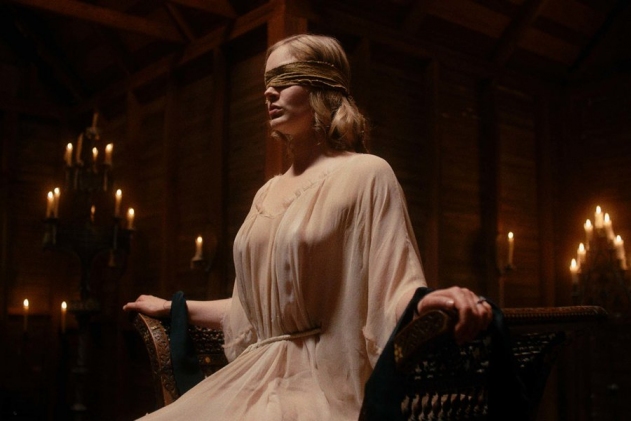
Rocket science has its origins in 1930s Los Angeles, where an occult religion that performed sex rituals appealed to the man who became one of the founders of NASA’s Jet Propulsion Laboratory (JPL). The television series STRANGE ANGEL, now preparing for its second season, explores the life of pioneering chemist and rocket engineer Jack Parsons. The series is adapted from George Pendle’s biography of Parsons of the same name. It stars Jack Reynor (DETROIT), Rupert Friend (HOMELAND), Bella Heathcote (THE MAN IN THE HIGH CASTLE), and Peter Mark Kendall (THE AMERICANS). STRANGE ANGEL is an original series for CBS All Access, CBS’s streaming service. It is produced by Ridley Scott’s Scott Free Productions. The series’ creator, Mark Heyman (BLACK SWAN), is now working on its second season that is set to premiere in summer 2019. Heyman has had a longstanding interest in science, beginning when he was in graduate school for film at NYU and won a Sloan Production Grant. He then went on to work for Darren Aronofsky whose 2006 film THE FOUNTAIN won the Sloan Feature Film Prize. We spoke with Heyman by phone from his car in Los Angeles.
Science & Film: How did you first hear about Jack Parsons? Was it through the book Strange Angel?
Mark Heyman: I grew up in New Mexico and my parents are ex-hippies who got involved in a weird spiritual group that I was raised around. It wasn’t really a cult, though it had certain trappings of one; there was a charismatic leader with a strange title and, you know, offbeat beliefs. But there weren’t compounds and white pajamas or anything [laughs]. I was raised kind of in that world, but my best friend’s stepfather had been a well-regarded chemist at the Los Alamos labs. So growing up there was an atmosphere [that combined] the weird, new age-y, hippie-dippie world of Santa Fe, New Mexico and also the hard science world of Los Alamos and the history of the Manhattan Project.
With that background, I had told my agent that if he ever ran across anything that took place in the world of New Age cults I’d always be interested in taking a look. Coincidentally, Scott Free, the producers of the show, had gotten rights to this book Strange Angel and had sent it to my agent needing a writer to adapt it. I hadn’t heard of Jack Parsons previously, but as soon as I got the book it was, aha, I can’t believe it. This world, even though it was taking place in the ’20s and ‘30s, felt so familiar to me—obviously a lot darker and weirder in many ways. I couldn’t believe a single individual had straddled this world of a crazy, black magic, sex cult and the burgeoning world of rocketry. So, that’s where my interest was sparked and then we were off to the races—although a very slow race [laughs], because it took several years to get off the ground.

S&F: The way the cult part of the story plays into the main character’s drive is really interesting. There is a supernatural element to the story because of that.
MH: Yeah. [The cult] made him think he had super powers. For me, what’s so fascinating is the power of belief. Because [Jack Parsons] believed in something that he thought gave him extra-human abilities, it drove him in his quest in a way that actually yielded results. It required someone who thought they could conquer anything and bend the world to their will to pursue something that seems as fringe and impossible as rocketry.
S&F: In the show, it really humanizes the character. Was humanizing the characters a challenge for you with the show, which features so many scientists?
MH: Yeah [laughs]. Very much so. We originally developed the show at AMC, and after AMC had read the pilot and given the green light to pull together a writers’ room, I was contacted by a woman named Dagny Looper. She had gone to CalTech and gotten a degree in astrophysics, then a PhD in Astronomy, and then had gone NYU for film school after me. She wrote me saying, if you ever need any help on this show I’d love to participate. Caltech was such a big part of the world in the show and I was overwhelmed with telling the rocket science part [of the story]. Even though we had this book, figuring out ways to make it approachable and not completely bone dry felt very challenging. Dagny came on board as our writers’ room assistant and then became our conduit to the world of Caltech and other science advisors who were specialists in their fields. So we were able to go straight to the source in a way.
What was still challenging was translating the science and making it feel dramatic. Rocket science has its reputation for a reason [chuckles] and even though the experiments themselves can be kind of fun to watch in that there are explosions and a lot of volatility, the theory going into it is pretty impossible to explain to a lay audience in a way that would be at all interesting.

S&F: Did you bring scientists into the writer’s room?
MH: We met with a chemist and aeronautics [specialist]. They were not permanently in the room but we had sit down sessions and phone calls with them—with the chemist especially. Particularly in the early part of Jack’s story, chemistry is a bigger part of what they were doing; they were inventing rocket science, but chemistry was his way in. We would ask [the advisors] specific questions, and then later on during the production itself we had several science advisors who would come to set to help us with everything from the equations on the board to explaining to the actors what their lines of dialogue actually meant. We had a lot of technical advisors to help us try to get the science as accurate as possible while still having it be approachable.
S&F: I’m curious to hear more about the dichotomy between rocket science and the religious cult, and how you interwove those parts into Jack’s character. Could you say a bit about that?
MH: What’s interesting about him as a real-life character was that I’m not sure he saw much of a distinction between the two sides of his life. I think he saw both of them as experiments to try to crack the unknown. So within the show [we were] always trying to link to the same major want of his, which is somehow to leave this realm for another. He is restless, searching. As long as both sides of his life were unified in that quest [the story] felt a little more seamless and not like we were just bouncing back and forth between worlds with no cohesion.
In the history of science the connection between science and mysticism is one that was always [there]. Isaac Newton was also an alchemist. Even Einstein was fairly religious. There is a long history of scientists also being interested in the mystical. In the 20thcentury is when [science and religion] started to become separate from each other. In a weird way, I saw Jack Parsons as the last of his kind, as someone straddling that divide when the divide was not as wide as it is now.

STRANGE ANGEL is available to stream on CBS All Access. Season two is set to air in summer 2019.
TOPICS